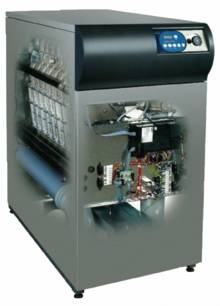New boilers for old

Unless system design and controls are integrated, condensing boilers such as Ideal Boilers’ Imax Xtra are likely to be only slightly more efficient than a standard boiler.
Changes to Building Regulations have made the move towards condensing technology for commercial applications inevitable, GRAHAM WILLIAMSON discusses the issues affecting specifiers and identifies what they need to know when considering a condensing boiler in a replacement application.The market for high-efficiency boilers is growing at about 20% per annum. However, the impact of new legislation has the potential to shrink the total market by as much as 4 to 6%, as businesses look to repair rather than replace, a trait which the domestic sector has already experienced since Part L1 of the Building Regulations was introduced in April 2005. But whilst the commercial market is far more complicated than the domestic sector, there are lessons we can learn from our domestic counterpart. The implementation of Part L2 in April 2006 has not gone smoothly. There is still a lot of confusion with specifiers and installers about how Part L2 will impact on the way they operate on a day-to-day basis. This can partly be attributed to the late delivery of the legislation documentation and manufacturers and industry bodies only now being able to support customers and communicate the key messages of what needs to be undertaken to comply. Part L2 is a Government strategy for tackling carbon emissions, so until installers and specifiers are made aware of and have fully read the more detailed compliance guides, supported by Approved Documents ADL2A (new buildings) and ADL2B (existing buildings), on the legislation, there will still be confusion on what can and cannot be done. As a leading manufacturer, it is our role now to do all we can to help the industry to get to grips as quickly as possible. The changes to the Building Regulation have for the first time established a seasonal efficiency figure for boilers of 84%. However, this in itself has caused some confusion. Taken literally, this means that, in most cases, only a condensing boiler can achieve this target. When selecting products, it is vitally important that specifiers and installers consider each application in its own right so real fuel savings and actual carbon reductions are made. The life of a heating boiler is usually around 25 to 30 years. Whilst modern, high-efficiency (HE) appliances can be installed to effectively replace older and less-efficient equipment in older buildings, to gain maximum benefit of an HE condensing boiler, the system design and controls need to be integrated to provide the ability for lower return temperatures. Without this, a condensing boiler is only likely to operate slightly more efficiency than a standard boiler. However, it must also be recognised that not all commercial-heating and hot-water systems can easily adopt condensing technology, either through design or suitability. These issues need to be considered if the full benefits of HE boilers are to be realised, especially in replacement applications, which account for over 70% of all commercial boilers installed. Specifiers need to address a number of issues when considering a condensing boiler. First, in older systems, there is likely to be a significant build up of sludge and debris developed over time. Modern condensing heat-exchanger technology, through its compact design, is less tolerant to these conditions, and the system may have to be cleaned prior to fitting the new boiler plant. Secondly, most condensing boilers require a greater flow rate through the boiler to maximise performance and prevent damage to the heat exchanger. The duty of existing pumps will need to be verified, and new pumps may need to be fitted. Finally, an existing installation will already have a flue system that may well have been installed for a number of years and may not be suitable for the newer condensing boiler. A particular issue is the amount of condensate that may be produced within the flue system. Overall, specifiers and installers need to be aware of the issues surrounding the Building Regulations and the benefits of high-efficiency technology. Condensing boilers can offer significant benefits, but all the implications of fitting them must be considered before installation, and they must not be seen as a solution for all applications.
Graham Williamson is business director for commercial heating with Ideal Boilers Ltd, PO box 103, National Avenue, Hull HU5 4JN.
Related links:


